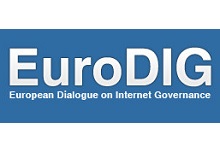Internet consolidation: Opportunities and challenges
19 Jun 2019 14:00h - 15:30h
Event report
[Read more session reports and live updates from the EuroDig 2019]
The session, moderated by Mr Wout de Natris (De Natris Consult), featured discussions on the reality and consequences of Internet consolidation, the process by which Internet activities and businesses get increasingly integrated, both vertically and horizontally. During the session, the phenomenon of consolidation was mainly addressed from four different aspects: technical, competition, societal, and future research.
Mr Carl Gahnberg (Internet Society) introduced the discussion by offering a definition of the concept of Internet consolidation. It consists of the process of increasing control over Internet infrastructures and services by a small set of organisations. Gahnberg presented recent studies by the Internet Society on this issue, in particular the recently published Global Internet Report 2019. The report illustrates how the consolidation trend translates into the various markets of the digital economy, such as Internet applications, access provision, and service infrastructures. Gahnberg also indicated that the key considerations and questions by the Internet Society focused on total service environments, interoperability as a function sale, the changing Internet topology, deep dependencies, and policy responses to consolidation.
Mr Jari Arkko (Internet Engineering Task Force [IETF]) provided a technical perspective on the process of Internet consolidation. Arkko recalled that the Internet was originally the ultimate decentralised system, providing equal opportunities to all actors in terms of access to users, regardless of their size. But in recent years, the Internet seems to have also fed the creation of large, centralised entities that provide most Internet services, because of networks effects, broader economic factors, and security considerations. At the technical level, consolidation occurs due to services’ network-based central functions. The domain name system (DNS) query services or e-mails provide instances of markets were systems have become more centralised, due to the consolidation of services, partly because greater resources are needed to deploy secure protocols. In order to limit consolidation patterns, the technical sector should support the development of more interoperable interfaces (in particular for social media platforms), more collaboration between small players, and investment in better security processes (such as end-to-end encryption and data minimisation).
Ms Marie-Noemie Marques (Orange) talked about Internet consolidation from a competition perspective. Marques first referred to the increasing number of reports directly focusing on competition and Internet platforms, such as those published this year by the European Commission, as well as the US and UK governments. Marques suggested that a number of digital conglomerates have emerged, as a result of acquisitions in a wide range of sectors. According to Marques, competition law should evolve to take into account these acquisitions and better understand the strategies of these players. The issue of responsibility of these players should be addressed, in order to ensure a level playing field for all business actors. Referring to the crucial role of data in the digital economy, Marques stressed that businesses need to facilitate data sharing in order to foster innovation and the creation of new services.
For Mr David Korteweg (Bits of Freedom) democracies need an online communications landscape in which people are empowered to receive and impart information, free from undue government and corporate influence. But a few giant corporations dominate the current online communications landscape and their dominance is increasing. This process could lead to the obstruction of our communications, including that of journalists and civil society, undue control over public debates, and limited possibilities for market challengers. Many of these corporations operate on a massive scale, some of them serving up to a quarter of the world’s population with a single service. Such services have a more or less monolithic architecture, interface, moderation process, and policy. All of these are rather rigid and unable to adapt to the specific needs of individuals and groups. The consolidation of the online communications landscape has a significant potential impact on societies within Europe. The question is whether we will be able to solve all issues by addressing individual symptoms. Instead, we may need to take a holistic view to analyse underlying systemic issues.
Ms Zoey Barthelemy (YouthDIG, UCL) indicated that the concentration of market power needs to be better understood. The root causes of Internet consolidation, as well as ways to measure its scale, need further study. Such research could feed into policies supporting models of co-operative platform economies.
By Clement Perarnaud
Related topics
Related event

